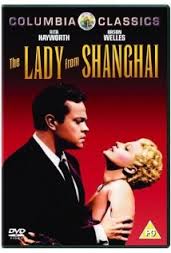
THE LADY FROM SHANGHAI
US, 1947, 86 minutes, Black and White.
Orson Welles, Rita Hayworth, Everett Sloane, Glenn Anders.
Directed by Orson Welles.
The Lady from Shanghai is a classic Orson Welles film. Written and directed by him, he also stars in a striking performance as a wandering Irishman caught up in a net of intrigue by the wealthy American set. It is also of interest because Welles directs his then wife, Rita Hayworth. It is a typical Rita Hayworth role and comes from the period of such films as Gilda. Welles himself also uses some of his friends that he used in such films as Citizen Kane, most notably Everett Sloane in a very effective central role. The Lady from Shanghai uses the black thriller conventions of the time and uses them well. Welles also has some enigmatic philosophising in his dialogue which he and Sloane mouth very effectively. The famous climax with the use of mirrors is a classic of its kind; but it was well imitated in such films as Enter the Dragon. Essential viewing for those interested in Orson Welles' multi-faceted career.
1. An enjoyable thriller? An Orson Welles film? Its place among his works? His reputation and the reputation of this film? His contribution to the writing, acting, directing and style of photography?
2. The film and the thriller style of the late 40s? The black comedy and ironic style? The presentation of wealthy amoral types, unscrupulous use of power, unscrupulous killing? The impact of this kind of amoral thriller now?
3. The black and white photography, Welles' emphasis on light and shadow for visual effect and for them? The film as a Rita Hayworth vehicle and her vitality and presence? The irony of her being the villainess? The visual positions of particular sequences, the use of silhouettes, the importance of tracking shots? The celebrated finale and the hall of mirrors, visual impact, suspense? The importance of the sound background: music, song, commercial etc.?
4. The significance of the title? Its application to the heroine and her background? The proverbs about human nature and their Chinese origins? The exotic Chinese background? The irony of the title 'Lady'?
5. The importance of the narrative spoken by Michael O'Hara and Orson Welles' brogue? Irish? The audience knowing his background but knowing as much as he did, sometimes more and therefore anticipation of the plot? The importance of the Irish brogue and the narrative? The importance of Michael O'Hara's angle and comments on himself during the plot? The dynamics of the plot in terms of murder mystery, character development, emotional entanglements, moral responsibilities? The significance of the shark fable and its references?
6. The complexities of the plot: the presence of Elsa, her attraction for Michael, involving him? The accident? Bannister and his role, the discovery that Elsa was his wife? Michael's resistance, succumbing to pressure, involvement in the plot to murder, his reaction to the various twists? Difficulty in following the plot, the retaining of audience interest?
7. Michael O'Hara and his character? Orson Welles' character, in himself, his capacity for thinking and reflecting, his reliance on feelings? His chasing Elsa, attracted by her, going to work for her? The risks that he took? His relating to Bannister, to Grigsby, Broome? His lack of observation in understanding what they were dragging him into? His gradual participation in the plot, the will, the fake murder? His being trapped? The importance of the court case and the condemnation? The escape and the chase? The irony of the ending? What would happen to him?
8. Elsa and Rita Hayworth's style as the femme fatale? Her seeming innocence, her passing over of guilt and the audience accepting this? The attractiveness, her singing the song and the style in which it was visualized with the focus on Rita Hayworth's beauty and allure? Her promises, her love for Michael, her using him? Her reaction in the prison? The revelation of the truth and the cold calculation of her attitudes?
9. Bannister as a character, as cripple, skilful lawyer? His wealth, his power, playing God? The impact of his speeches as a lawyer and as a man? His power of persuasion by word? The irony of the plots about his death? His presence at the end and his death in the hall of mirrors?
10. The contrast with Grigsby, the madness of his plot, the steps that he undertook, the going awry of the plan and his death?
11. The significance of Broome, his continued presence, the enigmas of his attitudes towards O'Hara, to Elsa, to Bannister? The significance of his death?
12. The rich world and its presentation in society, the yacht, sailing to various ports?
13. The various steps in which O'Hara was involved and the inexorable logic and audience participation?
14. An exciting thriller, a satisfying thriller in terms of plot, human character and motivation, moral fable?